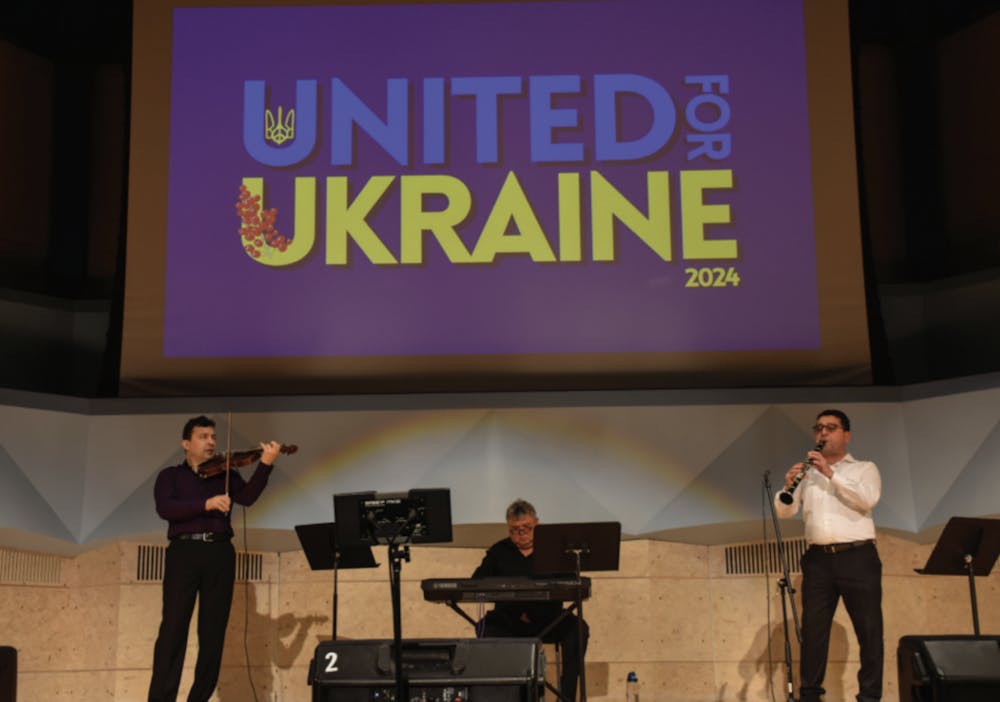Being a Ukrainian student in Vermont, studying at one of the most prestigious colleges in the United States, I feel the urge to use my privilege and resources to expedite Ukraine’s victory. My sister, my friends and my home remain in Kyiv. So, despite the 4,420 miles that physically separate me from Ukraine, the war is constantly on my mind, and I feel the need to do my part.
United for Ukraine is an annual event organized by Ukrainian students at Middlebury that first started as a response to the full-scale invasion of Ukraine two years ago. The underlying motif of the initiative is to raise awareness about the Russian war in Ukraine and to showcase Ukrainian art. Today, Russia is physically destroying Ukrainian cultural heritage by bombing and looting museums and theaters, murdering Ukrainian artists and promoting a narrative that there is no such thing as Ukrainian art. United for Ukraine is our form of protest against these wrongs.
United for Ukraine 2024 was dedicated to the power of art as a form of resistance against Russian oppression. It was a compilation of poems, dances, cinematography and music. The chronological scope of the program stretched from Ukrainian art under the Russian Empire to modern art created in the context of the ongoing full-scale war. In this way, the event aimed to situate today’s war in the context of centuries of Ukrainian resistance against Russian imperialism. This context can give people a better idea of why winning this war is so important for Ukrainians and should be important to everyone who values the human right to freedom.
The outcome of the Russian war in Ukraine relies heavily on which narratives prevail in the media space and who they benefit. Russia spends billions of dollars promoting ideas that discourage people from supporting and talking about Ukraine, and encourage them to vote against foreign military aid for Ukraine. That is why we, as Ukrainian students on campus, feel the urge to organize this event every year to tell people what this war really means to us.
My conversations with people from outside Ukraine, what I see people share on social media and media portrayal of the war in Ukraine demonstrate the lack of awareness of the context of this war. Ideas like “Russian-Ukrainian conflict is a proxy war between NATO and Russia,” or “Russia will eventually win so the military aid for Ukraine only prolongs the conflict and results in more death and destruction,” ignore the history of the Ukrainian colonial past under Russia and undermine the rights of Ukrainians for freedom and self-determination.
These points of view crucially miss the understanding that for Ukraine, losing this war is not an option. It would mean reversing history. It would mean forgetting the thousands who died for Ukrainian independence. It would be to forgive Russia for the genocide of the 1930s, for the deportation of indigenous people from Crimea and eastern Ukraine, for the persecution and murder of Ukrainian artists in the U.S.S.R. It would be to give up on our cultural and historical heritage that Russia will destroy or appropriate in case of its victory, and to lose our freedom.
Before the full-scale war, Ukraine was steadily moving toward important social changes such as the elimination of corruption and educational reforms. The feminist and LGBTQ+ movements were gaining more support from the people and more attention from the government. Today, during the Russian war, almost all the efforts of Ukrainians are focused on victory, and these social changes are no longer a priority. Losing the war means losing all the progress that was accomplished during Ukraine’s independence and being suppressed by Russian censorship.
So Ukrainians will never stop fighting. If Ukraine doesn’t get enough military aid, it means more casualties among the soldiers, more cities burned to the ground, more internally displaced people and more ruined lives. Ukraine will win, but the price of our victory depends on our joint efforts and the world’s support. I encourage every reader to think about whose narratives they support next time they share information about Ukraine on social media or engage in a conversation about Russian war, and I hope to see more people supporting Ukrainian initiatives on campus, United for Ukraine being one of them.



